There is no patient who has ever come to me bursting with joy.
I’m not insulted by families needing to take a deep breath before stepping into ALYN Hospital / ALYN Woldenberg Family Hospital, Israel’s only pediatric and adolescent rehabilitation facility, to provide their children with treatment. My goal, as is that of the devoted medical team working with me, is for families to leave us feeling confident and secure that they’ve come to the right place and received the best care possible.
Over the past two years, we’ve not only handled complex rehabilitative processes with children needing intensive care, but we have been forced to cope with protective equipment, regular testing, quarantines, vaccinations, and, worst of all, the absence of trust.
The work of doctors at a children’s rehabilitative hospital requires knowledge in many spheres. The patients and their families have already been experiencing anxiety, pain, worry and loss well before they reach ALYN’s doors. Children come here for rehabilitative treatment because they’ve been injured in accidents or suffer from severe illnesses and can’t do things most children do naturally, such as walk, communicate, play, and develop.
An ALYN physician must have extensive knowledge of pediatrics, rehabilitation, orthopedics, neurology and many more fields. They must also have the ability to deal with exhausted, vulnerable families.

Even if we are the best doctors, we can’t succeed without the families being a partner on the rehabilitative path and trust is the name of the game. Trust determines, more than all else, how successful the rehabilitation processes will influence a child’s capabilities going into the future.
The families must be a partner in the rehabilitation program; they must support it. That’s no simple request to make when we’re talking about families that have already gone through so much. Now a new kind of threatening gray cloud hangs over us all.
One of COVID-19’s harshest impacts is how the fabric of trust we once had is disintegrating. From being a medical authority on issues relating to rehabilitation, we’ve become transmitters of instructions on how to avoid passing on infections.
From wave to wave and one round of vaccinations to the next, the more the public argues against the government’s decisions, our status as physicians is eroded in the perception of our patients and their families. From being a source of knowledge and know-how, we’ve been forced to become another voice in the chorus of voices engulfing families.
Before COVID-19, it was rare for a family to argue with us over scientific issues and treatment plans. Most families said to us, “You’re the experts,” some said they wanted to consult with other family members or their rabbi first, but in almost all cases, everyone said, “We trust you. You’ve got the experience and the knowledge.”
However, today when it comes to COVID-19 instructions, we find ourselves facing families that challenge us with “But we heard,” and “You believe that, but we don’t,” as though professional knowledge is a matter of inner belief or spiritual faith. It’s extremely difficult to conduct treatment when there is trust in one sphere and none in another. If a patient doesn’t trust my recommendation to vaccinate, why would the patient trust my recommendation for a particular medication or course of rehabilitative treatments?
I’m not a virologist and I haven’t read every single article published about the pandemic. The field of medical knowledge is so vast that no one can know it all. That’s why the medical system developed into specializations in specific fields. Even within fields, we have a specialization, such as one heart specialist being the go-to person for catheterization and another heart specialist for arrhythmia.
No one can have all knowledge in depth. We trust each other and the system overall, so that the sum total of knowledge, research, articles, discussions, conferences and accepted practices will consolidate into what’s known as optimal conduct. Our system, where physicians interact, is one of trust: We learn from specialists and use this knowledge to benefit our patients.
The Covid-19 pandemic has pitched the world a tough fact: medical knowledge is in flux and it always is, all the time. There are no absolute facts, rather there are constant processes of innovation, learning and growth. Taken together, these processes amount to change.
You’ll never find one unequivocal truth in medicine. If it disappoints people that instructions change or update, as though that proves that physicians can’t be relied upon, such people simply don’t understand medicine’s driving principle: constantly trying to do better today than we did yesterday. Reality changes and we give chase to that reality.
Our work ensures that procedures provided by heart surgeons, ICU teams, neurosurgeons and so on, get translated into a child who can eventually return to school.
If a child’s family as our closest partners in the rehabilitation process aren’t with us all the way, the child won’t get far either.
Only if we successfully restore trust between us and our patients can we continue doing what we do best: constantly aim for improved health.
The writer is CEO of ALYN Hospital.
